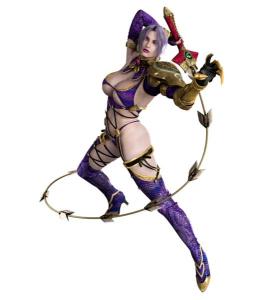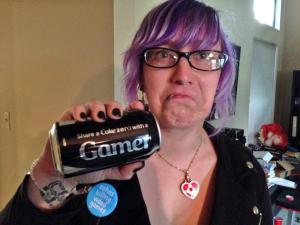
No one could’ve expected what would crawl out from under the rock known as GamerGate. That’s a lie, of course they could.
by Ed Button
One of the bigger topics online recently, at least in the world of Twitter, is #GamerGate. Regardless of familiarity with video games, there are valid points being brought up concerning ethics and the future of journalism, specifically video game journalism.
Some say that those using the #GamerGate hashtag are sexist pigs looking to purge the gaming industry of women, or at the very least, not helping combat the sexists.
Thinking critically, it’s possible both sides are right, while at the same time being so, so wrong.
The #GamerGate affair started on or about August 16th, when a man named Eron Gjoni wrote an extremely long blog post about his break-up with game developer Zoe Quinn, creator of Depression Quest. The post claims that Quinn admitted to Gjoni that she slept with a number of video game journalists; in retaliation, he decided to share some of their private conversations as proof of her admission. The blog post went viral despite a number of gaming sites keeping quiet due to the personal, sensitive nature of the topic.
A growing contingent of gamers upset that Quinn slept with gaming journalists were further aggravated that the same sites her lovers worked for were not covering this perceived “conflict of interest”. Twitter starting discussing the silence, as did boards like Reddit and 4chan. Soon, threads and comments on Reddit, 4chan, and the gaming sites in question that were asking about or discussing the issue were deleted, and some users were banned for bringing just bringing Quinn’s name up. “Censorship” was now in play. Foul was cried.
This aura of “censorship and corruption” continued to snowball and eventually reached a climax when at least ten prominent video game journalism sites decided, within a 48 hour window, to post editorials all calling the “gamer” identity – that is, the stereotype of white, male, sexist, racist and homophobic – dead and buried.
Gaming had moved on.
There were, now and forever, more people that played video games than self-identified “gamers”, and those who identify with the “gamer” moniker needed to change or get lost. This riled people up even more, as these articles were seen as extremely condescending attacks on the people who help build those sites, and the industry, into the things they are today, and as an attack against those who identify as “gamers”, such as myself, but aren’t sexist, racist, or homophobic.
On the other, uglier side of the issue you have Zoe Quinn (who, as a foot note, didn’t get “special treatment” of any sort after sleeping with said writers) and feminist commentator Anita Sarkeesian, who has a YouTube video series exploring sexist tropes in video games.
Both women have been on the receiving end of death threats, innumerable sexist comments and the posting of their personal information online. Sarkeesian says that she even fled her home due to threats and online harassment. Freelance writer Jenn Frank wrote a piece for The Guardian showing support for Sarkeesian and Quinn, and was harassed to the point that she quit her job.
To many who see GamerGate as only about sexism or the purging of females from the industry, “gamers” are dishing out the bullying that united many of them back when it wasn’t “cool” to play video games. They’re afraid of the sea change happening in their beloved industry, and are lashing out as more and more people become involved in game creation and play those games. Those who are content with sexism and questioning the “validity” of a girl’s love for comics or video games are being left behind, and it’s for the better.
All of this over video games.
That’s the basis of the start of this schism in the video game community. Erik Kain at Forbes gave an even more in-depth account of how the GamerGate story mushroomed. With everything said about GamerGate, much more will be said about the current “culture” of video games in general, particularly the inherent sexism, which sadly isn’t anything new.

The sexualization inherent in the depiction of female video game characters like Ivy from the SoulCalibur series presents it’s own obstacles.
Is sexism a problem in video games? There are two possible answers: yes, in that many games use women as window dressing or, and we’ll just use fighting game series SoulCalibur as an example, as prominent heroes and villains, but with cartoonishly large breasts and little clothing. Why?
At the same time, we have to ask whether sexism is or isn’t as huge of a problem in the industry as some are now making it out to be. To be sure, there many be scantily clad and hyper-sexualized female characters in games, but there are also strong female characters like Lara Croft from the “Tomb Raider” series, or Jill Valentine in “Resident Evil”.
Also, women are writing for gaming sites and have very successful YouTube accounts and corners of the Internet dedicated to video games and pop culture. “Assassin’s Creed 2” had Jade Raymond, a female, as its Executive Producer. “Journey”, the Playstation 3 exclusive which is one of the more highly regarded games of the past console generation, was co-produced by female Robin Hunicke. Kim Swift has worked on some of my all-time favorite games, “Portal” and “Left 4 Dead”.
Could there be more? Absolutely. But we aren’t there yet. Video games are, despite being around for almost 30 years, still in their infancy. How many prominent female movie directors were there in the 1950’s? How many prominent female directors are in Hollywood today?
This is not meant as a defense of sexism, or sexist tropes in the gaming industry. Sexism is a disgusting stain on humanity that, in 2014, shouldn’t exist. Gamers in general should be extremely excited for the future of games, as a larger variety of people get involved and more unique games are released. In fact, “Gone Home”, a game often derided for not actually being a “game” so much as an interactive story (like “Depression Quest”) about teenage angst and sexual identity, was considered a favorite gaming experience in the past year.
That said, is there sexism within the consumer base of video games? Undoubtedly. There’s rampant homophobia, sexism, racism and other -isms going on right at this very moment. Just get online and play a round of the latest “Call of Duty” with other anonymous people online, and soak in jabs at sexual preference, the sexual prowess of mothers and all sorts of other colorful names and phrases that are freely flung on a consistent basis.
At the same time, just because there is all sorts of nastiness going on within gaming, doesn’t mean that all people who play games or identify as “gamers” are for it. Are we sure that gamers, when they play games like the aforementioned SoulCalibur series, sit around and think: “Man, she’s got some big knockers. I want to punch them around and call her dirty things.”
Do some? Undoubtedly. Just as there are those who think killing a US President will endear them to Jodie Foster, or that Boondock Saints should be more influential than it is. But to lump people who enjoy playing the game because it’s a fun game in with the second group who sexualize and degrade the characters, and then project that sexualization onto others, is unfair.
To say that everyone who sides with #GamerGate hashtag is an awful, sexist monster, and that all of those who against sexism are calm, level-headed people who aren’t above calling people names may simply strain credulity.
ON THE GAMING INDUSTRY
Is there mass corruption going on in the halls of video game websites? Again, yes, and no. People questioning the validity and “purity”, if you will, of video game site coverage didn’t start with Zoe Quinn. In 2007, Jeff Gerstmann, who worked for gaming news and review site GameSpot for over ten years, was fired after he gave less-than-glowing reviews of a game called “Kane and Lynch”, which, at the time, was prominently advertised on the website. After people online raised a furor, GameSpot released information outlining the controversy saying that his underwhelming review didn’t lead to his firing.
Despite GameSpot’s insistence that the site didn’t fire Gerstmann over his review of the slightly broken, mostly garbage game, the Internet had made up its mind. The site hasn’t been the same since.
In 2012, video game journalist Geoff Keighley was interviewed by a gaming site about his experiences with the upcoming “Halo 4” game, while surrounded by Mountain Dew and Doritos products. Doritos and Mountain Dew just happened to be running a promotion that, if their products were purchased, allowed people who bought them to level their online character in “Halo 4” faster with special digital codes. Keighley’s reputation as a games journalist was permanently damaged after the video of the interview went viral, and he’s been sort of a running gag with gamers ever since.
Is this a blatant conflict of interest? Yes. However those examples are the minority: with the exception of a few people, these game journalists and personalities aren’t swimming in McDuckian pools of cash. In fact, most of those that write for national publications make less than I do working at a regional media outlet. But they do it because they love video games and they love writing.
In fact, some of what happens in video game journalism that is seen as a “conflict of interest” in the eyes of the pro-GamerGate people happens within most, if not all, types of tech or entertainment journalism – “Do you want first access to our unfinished product? Sure thing! Here’s some bullet points on the features you can tell your readers about.” If you don’t write nice things about their game or product, you won’t get access next time. Is it an incestuous relationship between those creating the products and those covering it? Yes, but it exists in all sorts of “first access”-type publications and websites that look to get information to their readers in a timely manner. It’s a deep-seeded problem that, unfortunately, has no easy answer.
People have also been questioning the endgame of developers for a while too: Developers of “Mass Effect 3”, the end of a critically-acclaimed sci-fi game trilogy that allowed gamers to create their own hero and make tough “life or death” decisions that would impact the story, told people before the third game came came out that all of their previous choices in the first two games would matter, and have an impact on the third game’s ending.
Except it didn’t.
The ending was, by many accounts, not only a bad and seemingly “tacked-on” ending, but none of the choices you made matter. After the game was out and more and more people complained about broken promises, some game developers and game journalists called gamers “entitled” and “whiny babies” for complaining about not getting the ending, or the product, they were promised. Couple that with $60 games being released seemingly half-finished and “complete” games being released with $10-20 “add-ons” available on release day, and you have a recipe for anger.
THE FUTURE
There’s a lot to mad about with GamerGate. Yes, there is rampant sexism online with seemingly no consequences for those who perpetrate the abuse, while those on the receiving end have everything to lose. The fact of the matter is that games have progressed from being seen as a geeky pastime to a complex form of storytelling and art, and with that comes criticism, both legitimate and illegitimate. The industry has moved beyond beeps and boops and asteroids and Pac-Man.
There is a problem with game journalism. Garnering exclusive or early access to a product could make writing a fair review difficult. However, you need those close relationships and contacts, because that’s how tech and entertainment journalism works. It’s the same in the music and film industry. When this is questioned, the journalists lash out and declare their supporters and detractors are a by-gone product of an industry that’s moved on. However, people are now seeing corruption in every tweet, review, and post, when it simply isn’t so. People should be allowed to associate with whoever they want to. Journalists need to make those decisions more carefully than others.
However, if you don’t like the status quo, change it. Make your own site. It’s easier than ever to start your own website and find like-minded people to discuss anything and everything. Just look at us here at the Never Daunted Radio Network.
It’s also easier than ever to make video games. Hell, there are video games that allow you to build videogames. If you don’t like the status quo, become a force for change.
There’s much to love about video games, the culture of video games and the camaraderie that comes with playing games with others. But that doesn’t mean we have to be happy about what’s going on within the culture.
On both sides.
Ed Button is an award-winning broadcaster based out of West Plains, MO. You can find him on Twitter @edb87.



6 Replies to “Is GamerGate the Devil We Know, or the One We Assume?”